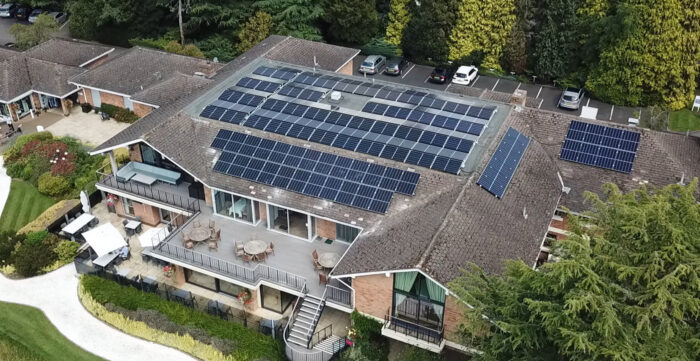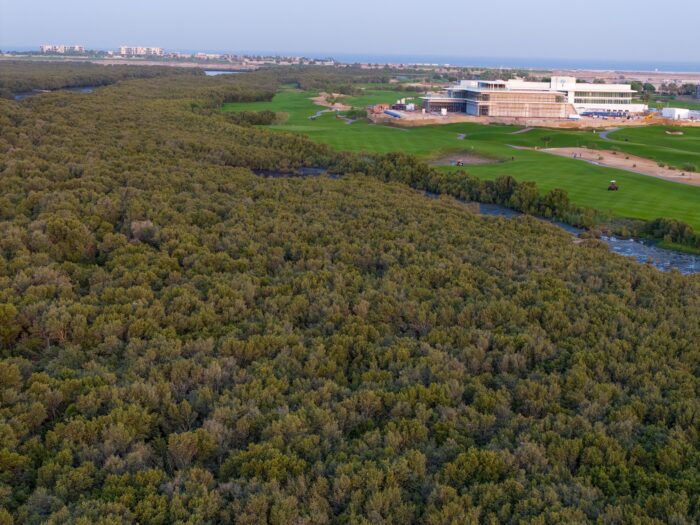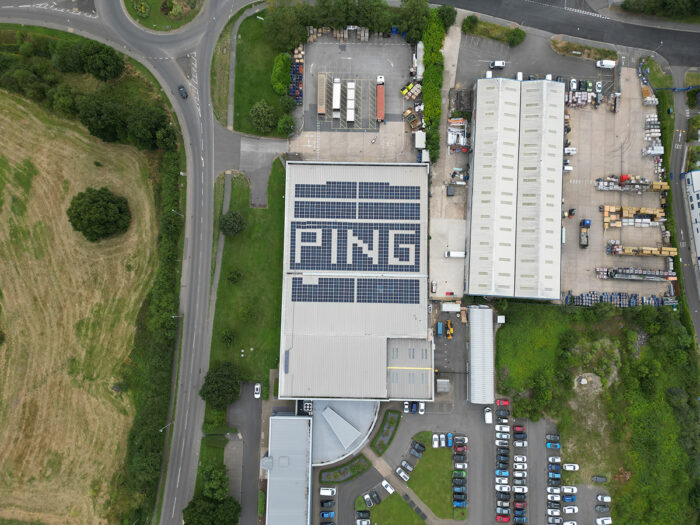The UK golf clubs that are planning for Net Zero
At least three golf clubs in the UK have announced plans to achieve net zero carbon emissions, particularly thanks to the installation of solar panels, which are also saving them thousands of pounds per year in energy costs.
As we saw in the summer of 2023, particularly in parts of Spain and France, golf courses in the west are vulnerable to attack from environmental activists who believe they use up too many resources.
Many of the attacks actually appeared to be based on inaccurate assumptions – and several golf clubs actually have plans to be ‘Net Zero’ venues.
Copt Heath Golf Club in the West Midlands, for example, plans to apply for planning permission to build a solar farm on land beside the 16th fairway.
The potential £300,000 investment is expected to generate 220,000 kw hours per annum and comes as the club has invested more than £50,000 in solar energy panels on its clubhouse roof.
Since the installation was completed last year, the club has saved nearly £5,000 in electricity costs and is on target to cut bills by £12,000 per annum. It has also resulted in the reduction of CO2 emissions by more than 3,100 kg to date – equivalent to planting 190 trees.
Copt Heath’s Neil Ridding, who chairs the club’s environmental and facilities committee, said: “We brought in energy consultants who were able to demonstrate how much energy we were consuming and where it was coming from.
“As well as reducing costs, we strongly believe that we should do all we can to protect the environment by using natural resources, as this will only benefit the course and our members in the long-term.”
Future plans include creating a water storage reservoir alongside the course practice area by extending an existing Environmental Agency license to draw water from a bore hole – an initiative which will help maximise natural resources and reduce waste, whilst protecting the course during summer drought conditions.

Elsewhere, the club is committed to investing in more environmentally friendly grounds equipment for the greenkeeping team and installing electric car charging points for members.
Sir Terry Morgan, chairman of Copt Heath, concluded: “As one of the region’s leading golf clubs we have a responsibility to do all we can to protect the environment and our course for future generations. By setting an emissions target of Net Zero by 2030 we are demonstrating a real commitment to getting things done.”
This comes as a golf club in Suffolk has said it has plans to be run entirely on renewable energy.
Fynn Valley Golf Club has installed 100 solar panels on its greenkeeper shed, which run at 45 kilowatt hours and creates a saving of roughly £10,000 each year.
“We want to be the first golf club in the UK which is run on entirely renewable energy,” explained Robert Cawley, Fynn Valley’s managing director.
The club was owned and run by the Tyrell family since its inception in 1991, until it was sold to Green Valley Leisure Resorts in 2022.
The club celebrated the anniversary by unveiling a brand-new solar farm installed on the roof of its greenkeeper equipment shed.
A screen monitoring the output of the panels was unveiled by Dr Daniel Poulter, MP for central Suffolk and north Ipswich.
Solar panels will be added to the roofs of the club’s lodges and Cawley said he is keen to explore harnessing wind energy, too.
Last year The Belfry also said it aims to achieve net zero carbon emissions by 2030.
Wycombe Heights Golf Centre, owned and operated by BGL (Burhill Group), has also unveiled a series of sustainability commitments as part of a continued journey towards achieving a net zero status.
The club has committed to seven fundamental aspects that will be implemented throughout and around the facility. These are: planning, policies and procurement, staff and golfer engagement, taking climate action, conserving resources, fostering nature, strengthening communities, and tracking and reporting.
Some of the key initiatives that are underway have already begun to have a positive impact. A switch to an electric greens mower has allowed the club to substitute diesel for zero carbon electricity as the energy source, irradicate the use of hydraulic fluid which is harmful to local habitats, and reduce noise which is positive for both neighbours and operations. Eventually, the club plans to run an entirely electric fleet.
Furthermore, the transition to an off-site renewable energy supply has helped reduce club emissions by over 51 tCO2e per year, a reduction equivalent to flying 15 times from London to Hong Kong, and 150,000 kms by car.

The most recent initiative has been the construction of a 12,000-metre cubed reservoir to enable the club to irrigate the course using a sustainable water source. Thanks to the investment, 100% of the water used on-site is derived from sustainable sources. This has also allowed the club to avoid supply and demand issues in drier periods.
Commenting on the club’s sustainability journey, Operations Director for BGL Golf, Guy Riggott, said: “Our success with sustainability initiatives so far is something we are very proud of, and we are excited to continue to follow our seven step commitment as we take that to the next level. Through these efforts, our goal is to benefit the environment as well as our employees, members, and visitors.”
Riggott, added: “The work and commitment from Wycombe Heights towards improving sustainable practices is incredible. Across the group, we’re passionate about finding new ways to reduce energy, water consumption, and overall carbon footprint. We are excited to see the continuation of this programme with new initiatives that align with our seven step commitment to sustainability.”
This is a movement that golf clubs across the world are involved in.
Lake Michigan Hills Golf Club says it has become the first carbon neutral golf club in the United States after purchasing carbon capture credits to offset all CO2 emissions associated with every round played in 2022.
“We think sport can play an important role in a low carbon future,” a spokesperson said. “The ability to break down each tonne of emissions into fractions in a traceable manner allows us to spread the cost of offsetting.”
And Al Zorah Golf Club in the United Arab Emirates celebrated Sustainable Golf Week in October by planting a mangrove tree for every golfer who visited the club in 2023 – with players even invited to make the journey to Al Zorah Mangrove Natural Reserve to plant the tree themselves.

As well as producing millions of litres of oxygen per day, mangroves are vastly more effective in trapping carbon dioxide than other trees. Particularly pivotal in coastal ecosystems, mangrove forests also help to protect shorelines against erosion caused by waves and storms, while their branches and roots are a habitat for a diverse range of unique species.
Mangroves are more than just oxygen generators; they are powerhouses for carbon storage, acting as one of nature’s coastal shields. They are also sanctuaries for an array of unique species. Their presence is pivotal in coastal ecosystems, and they serve as frontline defenders against the adversities of climate change.
Philip Henderson, general manager of Al Zorah Golf Club, said: “Complete commitment to sustainability is key to the future of the sport of golf, but it is also an ethos that runs through every part of Al Zorah City across the board.”
Meanwhile, equipment manufacturer, PING, has taken the next steps towards sustainability by installing 655 energy saving solar panels onto the roof of its headquarters in Gainsborough in the shape of the PING logo.

The panels will produce 250,000 kilowatt hours of energy per year of which 71.5 percent will be consumed first hand by the business within day-to-day operations.
This will have a significant impact on PING’s energy consumption and result in the organisation being 41.5 percent self-sufficient in terms of energy use. Any energy not used will be put back into the grid to ensure there is no waste from the solar panels.















I would love to see brands like Ping, Callaway, Taylormade and others would do more in terms of sustainability…would integrate sustainability in production and products, not just in a field (solar power) where they can save money ☝️